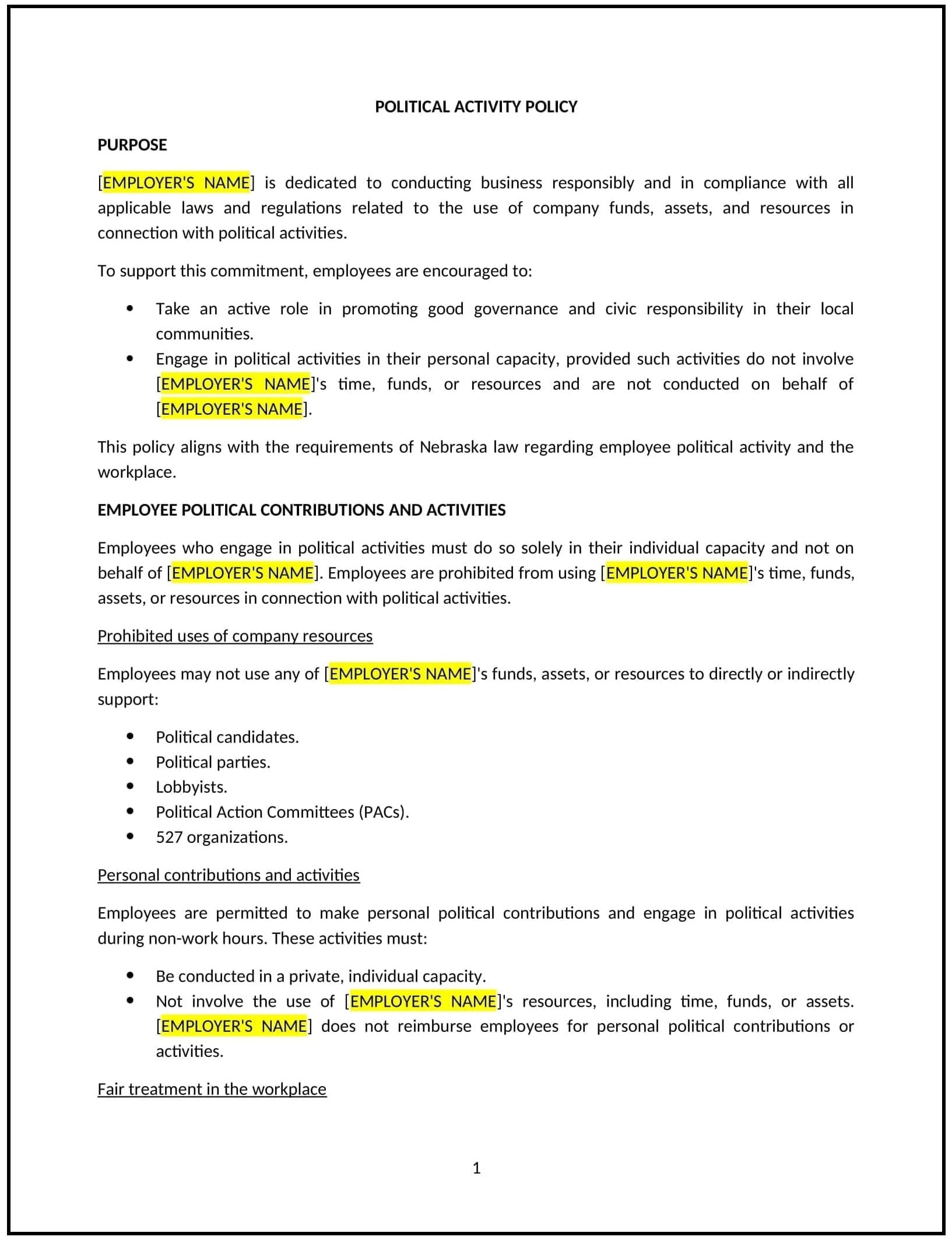Political activity policy (Nebraska): Free template
Got contracts to review? While you're here for policies, let Cobrief make contract review effortless—start your free review now.

Customize this template for free
Political activity policy (Nebraska)
A political activity policy helps Nebraska businesses manage and set clear expectations regarding employees' involvement in political activities while at work or during work hours. This policy outlines the guidelines for employees who wish to participate in political activities, ensuring that such activities do not interfere with their job performance, company operations, or violate any ethical standards. It also provides guidance on how employees should balance their personal political beliefs with their professional roles in a way that promotes a respectful and neutral workplace environment.
By adopting this policy, businesses in Nebraska can create an environment that respects employees' rights to engage in political activities while maintaining a professional and productive workplace.
How to use this political activity policy (Nebraska)
- Define acceptable political activities: Specify the types of political activities that employees can engage in, both inside and outside the workplace. This includes voting, campaigning, fundraising, and participating in protests or demonstrations. The policy should clarify that such activities should be conducted during non-work hours and not interfere with work responsibilities.
- Prohibit political activities during work hours: Make it clear that political activities should not be conducted during work hours or using company resources. This includes using company email, phones, or other resources for political purposes, as well as engaging in political discussions that may disrupt work or create conflicts among employees.
- Respect employees' rights: Emphasize that the policy respects employees' right to participate in political activities as private citizens. Employees should be allowed to express their personal political beliefs during non-working hours, but they should be reminded to separate their personal views from their professional roles.
- Address conflicts of interest: Specify that employees should avoid engaging in political activities that may present a conflict of interest, particularly if their role involves making decisions that could directly affect political organizations or candidates.
- Maintain a neutral workplace: Encourage employees to respect one another's political views and avoid discussions that may lead to workplace division or hostility. Create guidelines to foster a respectful and inclusive environment, where political discussions are avoided during work hours and employees feel comfortable regardless of their political views.
- Provide clarity on company political contributions: If the company makes political contributions, specify how this process is handled, including who is responsible for making decisions and ensuring that contributions align with the company's values and legal requirements. Employees should be made aware that any company-wide political contributions are separate from individual political activity.
- Review and update: Regularly review and update the policy to ensure it remains relevant and compliant with any changes in Nebraska state law or federal regulations regarding political activities in the workplace.
Benefits of using this political activity policy (Nebraska)
This policy provides several benefits for Nebraska businesses:
- Maintains workplace neutrality: By outlining clear guidelines, businesses can maintain a neutral workplace, ensuring that political activities do not disrupt operations or create conflicts among employees.
- Supports employee rights: The policy helps employees balance their right to engage in political activities with their responsibility to maintain professionalism while at work.
- Promotes respect and inclusion: By encouraging respect for diverse political views, the policy fosters an inclusive work environment where all employees feel valued regardless of their personal beliefs.
- Protects business interests: A clear policy helps businesses avoid potential legal risks related to political activity, ensuring that activities do not interfere with company operations, business relationships, or employee performance.
- Reduces workplace conflicts: By setting expectations for political activity, businesses can prevent conflicts between employees with differing political views, ensuring a more harmonious and productive work environment.
Tips for using this political activity policy (Nebraska)
- Communicate the policy clearly: Ensure that all employees understand the policy and how it applies to them. Include the policy in employee handbooks, onboarding materials, and internal communications.
- Encourage respectful behavior: Foster a culture of respect by encouraging employees to be mindful of their political discussions and ensuring that such discussions do not disrupt the work environment.
- Monitor workplace dynamics: Keep an eye on the workplace environment to ensure that political activity is not causing division or discomfort among employees. Address any concerns that arise promptly.
- Respect diversity of thought: While political activity should be managed to avoid conflict, businesses should also respect and embrace the diversity of thought among employees, ensuring that no employee feels silenced or marginalized.
- Review regularly: Regularly review the policy to ensure that it remains aligned with the company’s needs and the evolving legal and social landscape surrounding political activities in the workplace.